Rock Identification Exam 2
1/68
There's no tags or description
Looks like no tags are added yet.
Name | Mastery | Learn | Test | Matching | Spaced | Call with Kai |
|---|
No analytics yet
Send a link to your students to track their progress
69 Terms
Pumice
-Igneous
-volcanic
-vesicular
-Intermediate/felsic
-made up of light minerals
-formed last in Bowens reaction series
Uses: abrasives
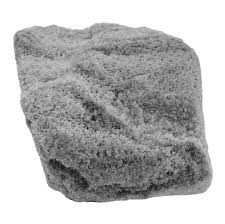
Diorite
-Igneous
-plutonic
-porphyritic/pegmatatic
-intermediate (felsic-mafic)
-Ca/Na plagioclase, pyroxene, hornblende (amphibole)
-formed in the middle of Bowens reaction series
uses: construction
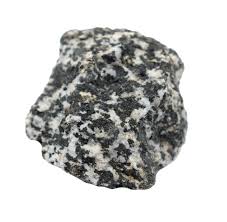
Pegmatite (teeth)
-igneous
-plutonic
-pegmatitic
-felsic
-K-feldspar, quartz, Na-plagioclase
-formed at the end of Bowens reaction series
uses: construction
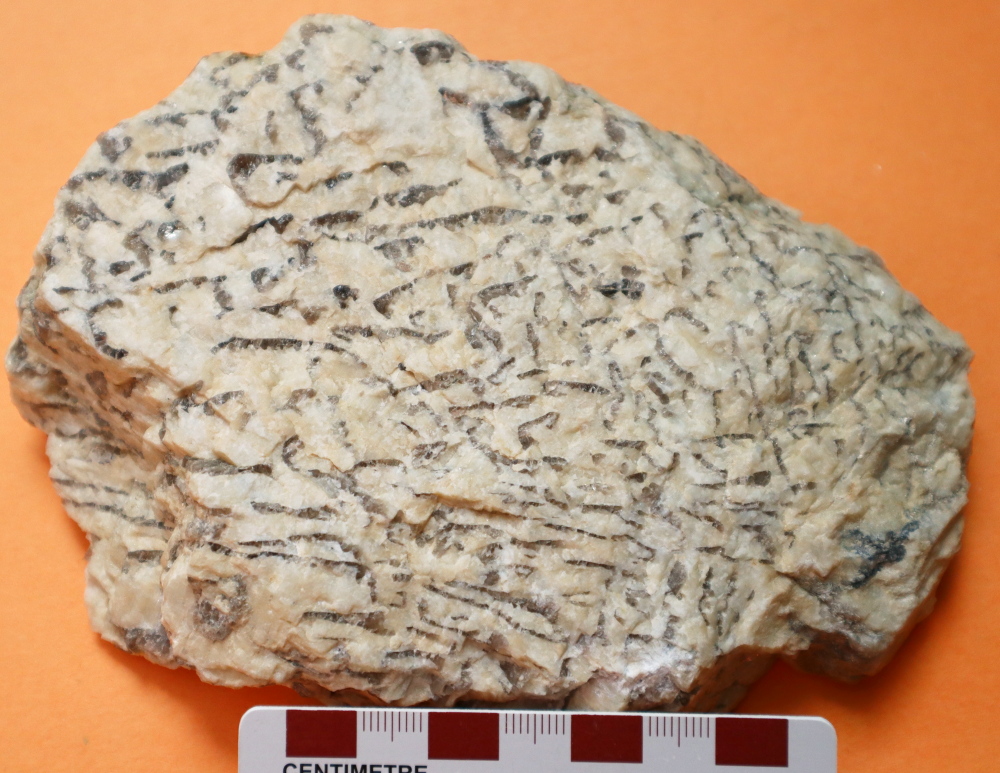
granite
-igneous
-plutonic
-phoneritic
-felsic
-K-feldspar, quartz, Na-plagioclase
-formed at the low temp extreme of BRS
uses: countertops
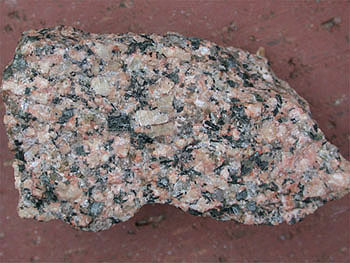
Scoria
-igenous
-volcanic
-vesicular
-mafic/intermediate
-made up of dark minerals
-forms at the middle-upper section of BRS
uses: construction
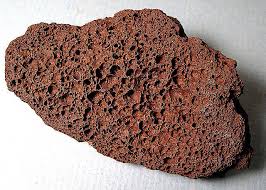
obsidian
-igneous
-volcanic
-glassy
-felsic
-made up of dark minerals
-forms at the end of BRS
uses: jewelry
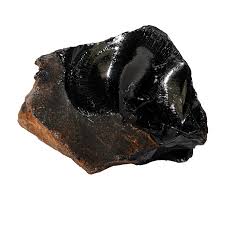
Basalt
-igneous
-volcanic
-amygdaloidal
-mafic
-Ca-plagioclase, pyroxene, olivine
-forms at beginning of BRS
uses: construction
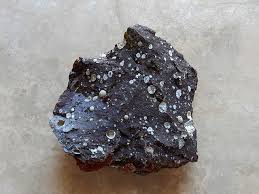
Gabbro
-igneous
-plutonic
-phaneritic/porphyritic
-mafic
-Ca-plagioclase, pyroxene, olivine, hornblende
-forms at upper-middle of BRS
uses: construction
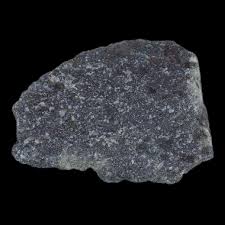
Andesite
-igneous
-volcanic
-aphanitic, porphyritic, vesicular, amydgoloidal
-intermediate
-Ca/Na plagiocalse, pyroxene, hornblende
-forms in the middle of BRS
uses: construction
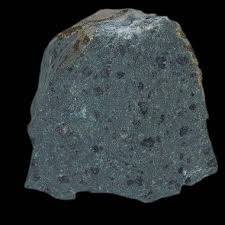
Syenite
-igneous
-plutonic
-phaneritic, porphyritic
-felsic
-K-feldspar, Na-plagioclase, quartz
-forms late in BRS
uses: building
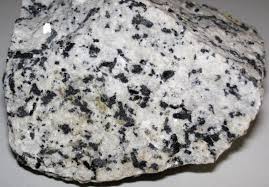
basalt
-igenous
-volcanic
-aphanitic, glassy, porphyritic
-mafic
-Ca-plagiclase, pyroxene
-forms at the beginning of BRS
uses: construction
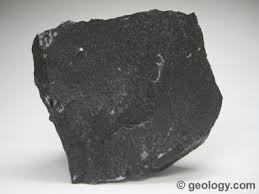
Rhyolite
-igneous
-volcanic
-aphanitic
-felsic
-K-feldspar, quartz, biotite
-forms at the end of BRS
uses: construction
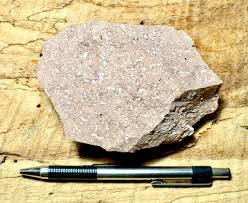
Granite
-igneous
-plutonic
-porphyritic, phaneritic
-felsic
-K-feldspar, quartz, Na-plagioclase
-forms at the low temp extreme of BRS
uses: countertops
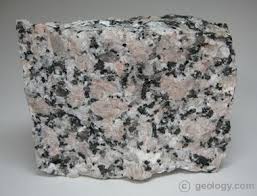
Trachyte
-igneous
-volcanic
-porphyritic
-felsic
-Ca-plagioclase, pyroxene
-forms in the middle of BRS
uses: construction/building
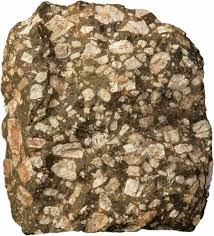
Basalt
-igneous
-volcanic
-vesicular
-mafic
-Ca-plagioclase, pyroxene
-forms at beginning of BRS
uses: construction
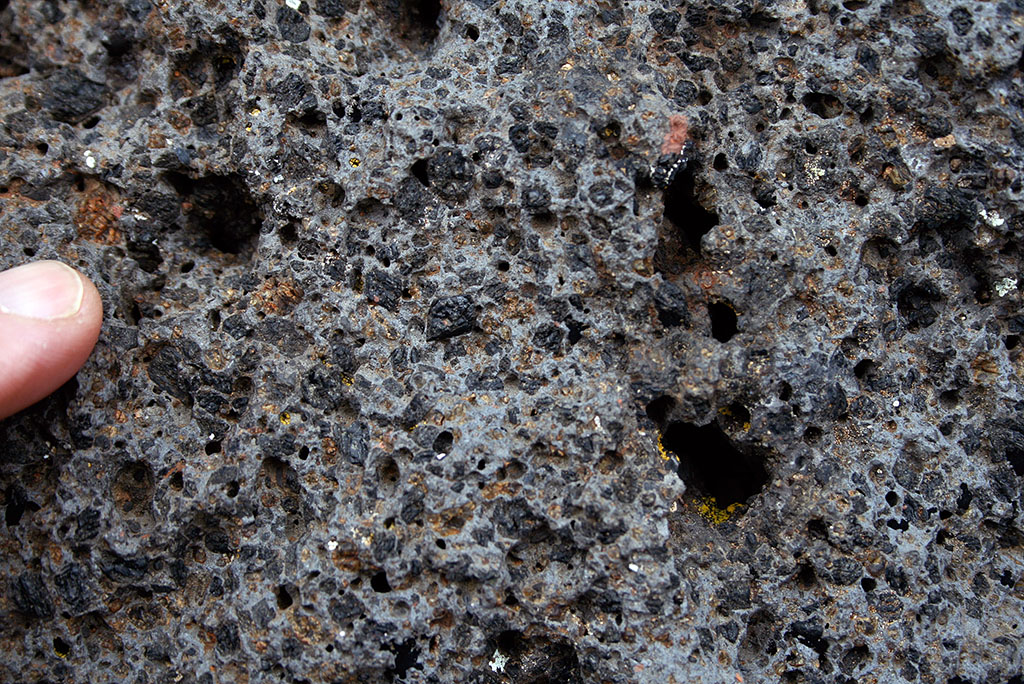
Tuff
-igneous
-volcanic
-aphanitic, porphyritic
-felsic/intermediate
-volcanic ash, pumice
-doesn’t form within BRS
uses: building
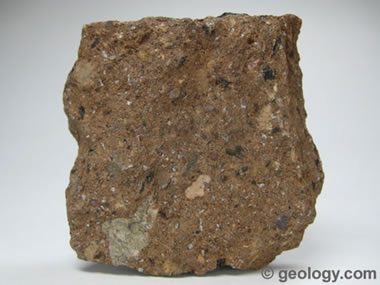
Glassy
Igneous volcanic texture
-No visible grains, smooth, shiny
Vesicular
Igneous volcanic texture
-presence of spherical to elongated holes throughout the rock
Amygdaloidal
igneous volcanic texture
-Filled vesicular texture, where filling consists of other minerals lining or completely filling vesicles
Aphanitic
igneous volcanic texture
-most crystals are visible to the naked eye, some may be big enough to catch the light. Not glassy
Porphyritic
igneous plutonic/volcanic texture
-Crystals of multiple sizes
volcanic rocks - matrix is aphanitic embedded with several mm to cm size larger crystals
plutonic rocks - matrix is phaneritic embedded with several cm size larger crystals
Phaneritic
igneous plutonic textures
-all crystals are visible without magnification and all about the same size
Pegmatitic
All crystals are several cm in size, extremely coarse texture
Mafic
dark colored minerals
felsic
light colored minerals
intermediate
a moderate silica content, falling between the high silica content of felsic rocks and the lower silica content of mafic rocks
Plutonic (intrusive)
rocks are formed from magma cooling and solidifying underground
-large crystals
Volcanic (extrusive)
rocks are formed from lava cooling and solidifying above ground
-small crystals
Quartz Arenite Sandstone
-sedimentary
-clastic
-coarse to fine grain
-poor to well sorted
-sub angular to rounded shape
-quartz
-primary source of quartz arenite is the weathering of rocks containing quartz, such as granites, or other quartz-rich rocks
uses: construction
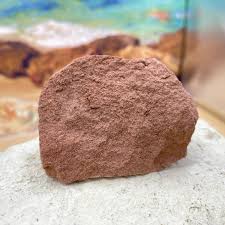
Quartz Arenite Sandstone
-sedimentary
-clastic
-coarse to fine grain
-poor to well sorted
-sub angular to rounded shape
-quartz
-primary source of quartz arenite is the weathering of rocks containing quartz, such as granites, or other quartz-rich rocks
uses: construction
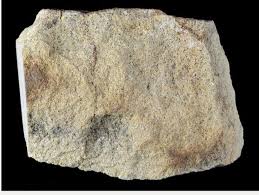
Arkose Sandstone
-sedimentary
-clastic
-coarse to fine grained
-poorly sorted
-sub-angular to rounded shape
-quartz, K-feldspar
-rapid weathering and erosion of feldspar-rich igneous or metamorphic rocks, particularly granitic rocks
uses: construction
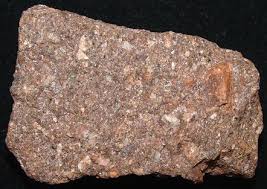
Fossiliferous Limestone
-sedimentary
-biochemical
-shell fragments
-carbonate mud
-will react to HCl
-originates from shallow, warm, marine environments
uses: construction
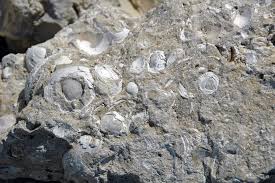
Oolitic Limestone
-sedimentary
-chemical
-calcite
-will react to HCl
-forms in warm, shallow, agitated marine environments
uses: building
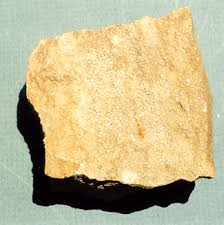
Chert
-sedimentary
-biochemical
-sponges, radiolarien, siliceous diatoms
-quartz
-wont react to HCl
-forms from biogenic silica from marine organisms like radiolarians and diatoms
uses: construction
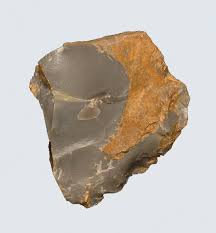
Shale
-sedimentary
-clastic
-extremely fine grained
-well sorted
-rounded shape
-clay minerals
-forms from compaction of fine-grained mud and clay particles, typically deposited in slow-moving or still water environments
uses: oil and natural gas
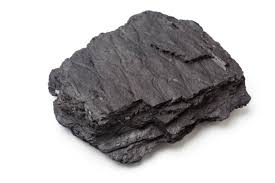
Bituminous Coal
-sedimentary
-biochemical
-organic carbon
-wont react to HCl
-forms from the transformation of buried plant material, particularly peat, under high pressure and heat over millions of years
uses: electricity generation
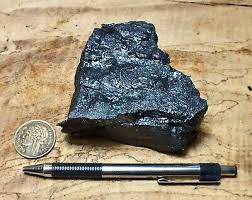
Breccia
-sedimentary
-clastic
-coarse grained
-poorly sorted
-angular to sub-angular shape
-quartz, chert
-forms from processes like landslides, rock avalanches, faulting, volcanic eruptions, or meteorite impacts, resulting in the accumulation of broken rock debris
uses: decorative uses
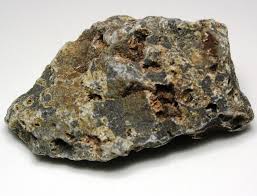
Siltstone
-sedimentary
-clastic
-fine grained
-well sorted
-unidentifiable shape
-quartz, clay
-forms in relatively quiet depositional environments where silt-sized particles can settle out of moving water or wind and accumulate
uses: construction
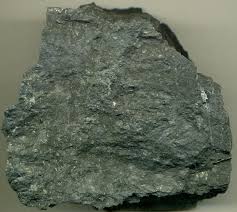
Conglomerate
-sedimentary
-clastic
-coarse grained
-poorly sorted
-rounded to subrounded
-quartz, chert
-sediments deposited by fast-moving rivers and streams, or by wave action along beaches, where these clasts are transported and then cemented together over time
uses: construction
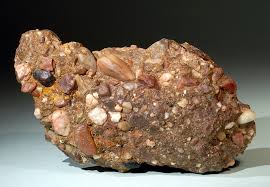
Greywacke Sandstone
-sedimentary
-clastic
-fine to med grained
-poorly sorted
-sub-angular to rounded shape
-quartz, clay
-forms from the rapid deposition of mixed sediments, including sand, silt, and rock fragments, in deep ocean environments
uses: construction
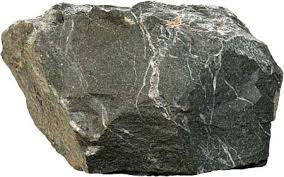
Mudstone
-sedimentary
-clastic
-extremely fine grained
-clay minerals
-forms in quiet, low-energy environments like tidal flats, lakes, and the deep sea, where clay particles accumulate and harden over time
uses: construction
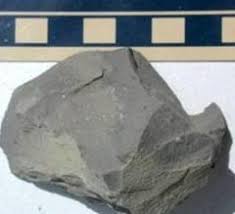
Coquina
-sedimentary
-biochemical
-shell fragments
-high porosity
-will react to HCl
-shallow coastal areas, especially in tropical or sub-tropical marine areas
uses: building
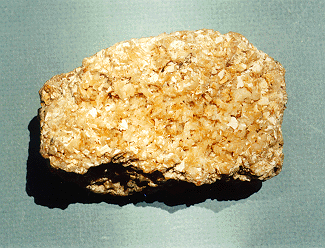
Shale
-sedimentary
-clastic
-extremely fine grained
-well sorted
-rounded shape
-clay minerals
-forms from compaction of fine-grained mud and clay particles, typically deposited in slow-moving or still water environments
uses: oil and natural gas
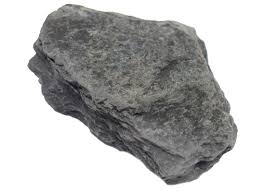
Dolostone
-sedimentary
-biochemical
-visible shell fragments
-calcite
-will react to HCl
-formed by the replacement of pre-existing calcium carbonate sediments (limestone) by magnesium-rich fluids, a process called dolomitization, often occurring in ancient marine environments
uses: construction

Clastic
rocks composed of broken pieces of older rocks
Biochemical
those formed through the biological activity of organisms, where they extract chemicals from their environment to build their skeletons or body parts, which then accumulate and lithify into rock
-May react to HCl
chemical
formed through the chemical precipitation of minerals from water solutions, resulting in the accumulation and subsequent compaction of these mineral grains
-reacts to HCL
Slate
-metamorphic
-foliated
-slaty
-red slate
proliths: shale or mudstone
-regional metamorphism - low>med>high grade
uses: construction
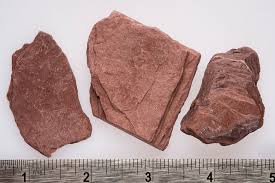
Phyllite
-metamorphic
-foliated
-phyllitic
-amphibole, Ca-plagioclase, quartz
proliths: shale or mudstone
regional metamorphism - low>med>high grade
uses: decorative applications
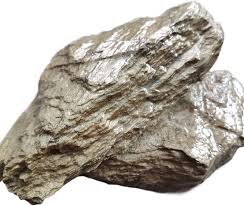
Biotite Schist
-metamorphic
-foliated
-Schistose
-biotite, muscovite, feldspar
proliths: shale or mudstone
regional metamorphism - low>med>high grade
uses: decorative applications
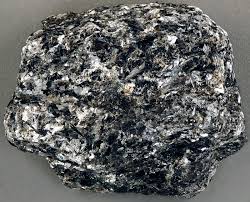
Muscovite Schist
-metamorphic
-foliated
-schistose
-muscovite, quartz
proliths: shale or mudstone
regional metamorphism - low>med>high grade
uses: building
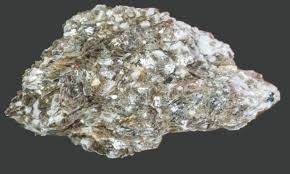
Marble
-metamorphic
-nonfoliated
-crystalline
-calcite, quartz, feldspar
proliths: limestone or dolostone
regional metamorphism - med grade
uses: construction
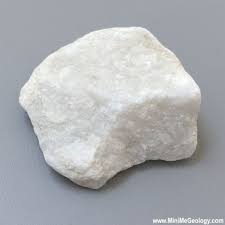
Granite Gneiss
-metamorphic
-foliated
-gneissic
-Na-plagioclase feldspar, biotite, hornblende
proliths: felsic, intermediate plutonic rocks
regional metamorphism - high grade
uses: construction
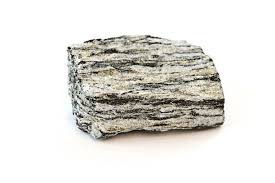
Feldspar Gneiss
-metamorphic
-foliated
-gneissic
-K feldspar, plagioclase feldspar, hornblende, quartz
proliths: felsic or int. plutonic rocks, granite, diorite
Regional metamorphism - high grade
uses: construction
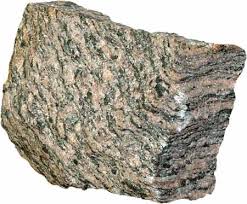
Quartzite
-metamorphic
-nonfoliated
-micro-crystalline
-quartz, micas
proliths: sandstone
regional metamorphism - high grade
uses: countertops
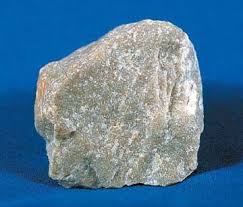
Feldspar Gneiss
-metamorphic
-foliated
-striations
-gneissic
-feldspar, hornblende
proliths: felsic or int. plutonic rocks, granite, diorite
regional metamorphism - high grade
uses: construction
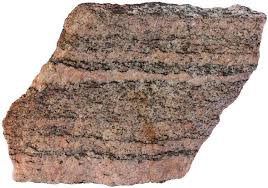
Amphibole Schist
-metamorphic
-foliated
-shistose
-amphibole (hornblende)
proliths: mafic igneous rocks (basalt, gabbro)
regional metamorphism - low>med>high grade
uses: construction
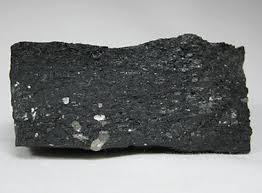
Anthracite Coal
-metamorphic
-nonfoliated
-micro-crystalline
-carbon
proliths: bituminous coal
regional or contact metamorphism - low grade
uses: heating systems
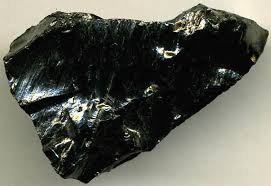
Green Schist
-metamorphic
-foliated
-schistose
-chlorite, biotite, schist
proliths: mafic volcanic/plutonic rocks, basalt, gabbro
regional metamorphism - low grade
uses: decorative purposes
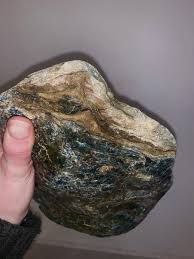
Gray Slate
-metamorphic
-foliated
-slaty
-amphibole
proliths: shale or mudstone
regional metamorphism - low>med>high
uses: roofing
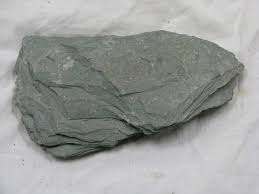
Eclogite
-metamorphic
-nonfoliated
-crystalline
-garnet, pyroxene, quartz
-proliths: mafic volcanic, plutonic rocks, gabbro, basalt
regional metamorphism - high grade
uses: geologic research
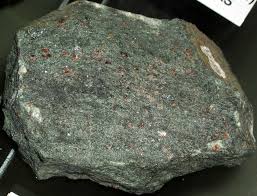
Amphibolite (schist/gneiss)
-metamorphic
-foliated
-shistose/gneissic
-amphibole, quartz
proliths: mafic volcanic, plutonic rocks, basalt, gabbro
regional metamorphism - high grade
uses: construction
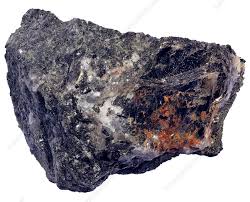
Serpentinite
-metamorphic
-nonfolliated
-serpentine, quartz
proliths: ultramafic plutonic rocks, peridotite
regional metamorphism - med grade
uses: decorative architecture
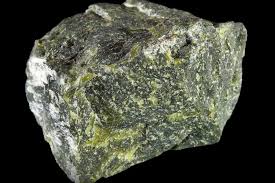
Slaty
No visible grains, dull luster, well developed cleavage surfaces along which rocks splits into flat sheets/tiles
Phyllitic
No visible grains, satin/polished luster, foliation is distinctly wavy
Schistose
Visibly platy minerals (sparkly mm-size to large cm-size crystals) along wavy foliation planes. Shiny rock commonly containing other large visible crystals
gneissic
Distinct banding with alternating bands of different minerals. (usually light and dark alternating bands, sometimes banding may only contain one prominent mineral). Micas may be present but do not dominate the foliation as in schists
Foliated
metamorphic rocks that exhibit a layered or striped appearance due to the parallel alignment of mineral grains, often caused by pressure or heat during metamorphism
Non-foliated
lack a layered or banded appearance, unlike foliated rocks, and are characterized by a more uniform texture due to the recrystallization of minerals without directional pressure